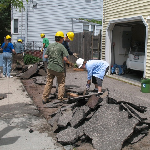Pitch
Depave driveways to decrease urban heating!
Description
Summary
Asphalt traps significantly more heat than vegetative ground cover, e.g. grass. Thus asphalt driveways contribute to the urban heat island effect. By depaving driveways and replacing all or most of the surface area with grass or other vegetative cover, the urban heat island effect would be reduced. To ensure that additional grass and vegetation does not increase potable water consumption for urban garden irrigation, the program should also assist property owners with rain barrel installation to irrigate the lawn, potentially using a solar powered pump and adjustable sprinkler.
Even partial depaving will help and grass can be reinforced or supplemented with some stone to maintain a practical driveway. Based on census data we estimate that tens of thousands of square feet of pavement could be depaved from driveways alone in Cambridge. In the city of Portland, Oregon, over 50,000 square feet of pavement was removed through volunteer efforts alone!
Category of the action
Adaptation
Who will take these actions?
The program would involve targeted advertising to property owners, and a one-stop shop scheduling of the services (depaving, landscape design and implementation, rain barrel installation). Services would be provided by approved vendors; customers could choose of course to source their own service providers, but the program would provide a list of participating vendors. Also the program would help schedule the vendors and supervise the services being performed properly.
The program could be run by the city directly (e.g. CDD/DPW), or through a third-party contractor hired to staff and supervise the program for its duration. The program could be funded for a set number of years in advance, with specific annual goals in terms of properties converted, gallons of rain barrel storage installed and square feet of pavement removed. Work would take place during the spring, summer and fall months only.
Property owner outreach would be a significant component, which could be part of a broader educational campaign on environmental stewardship by the city (recycling, home energy efficiency, water consumption, renewable energy, transportation choices, etc.). Property owners who signed up would be shepherded through the steps, and costs, including:
De-paving: free through volunteers, organized by Somerville Climate Action, except for dumpster rental. City could waive dumpster permit fee specifically for depaving projects.
Landscaping: optional (property owner could DIY); cost varies by vendor and level of service provided.
Rain barrel: discounted purchase through existing DPW rain barrel purchasing program. Free installation available from non-profit Green Cambridge, Inc. which is also launching a rain barrel conversion program for low-income households.
Solar pump and sprinkler optional.
What are other key benefits?
Additional benefits include carbon sequestration in the soil by grass/plants, decreasing future climate change and hence decreasing future urban heat island impacts.
More importantly, depaving improves storm water run-off water quality (provided no chemical fertilizers are used on the new lawn!), which improves the watershed, which improves opportunities for sea grass growth in Boston Harbor, further adding to carbon sequestration.
Rain barrel installation decreases storm water run-off volume, preventing flooding, and reduces potable water consumption for gardening and irrigation, thereby reducing energy consumption in both water and sewage treatment facilities. The city already recognizes these benefits and promotes rain barrel installation but this effect would be enhanced through this proposal.
What are the proposal’s costs?
Costs to the city would be for staff time to promote and operate the program. Financial incentives could be provided as well, to help offset the cost to property owners. Net costs are difficult to calculate because the city would correspondingly save money on reduced water and sewage treatment energy expenditures which are considerable. City would also save money on flood damage to infrastructure due to reduced storm water runoff.
Rough calculations, at $50,000 for one FTE per year, plus $1,000 incentive per property owner, city could subsidize 50 depavements per year, plus additional depavements un-subsidized (could be first come first serve, e.g.) for $100,000/year. Add incidental expenses for marketing materials, etc. so $120,000 - $150,000 per year could lead to 50+ depavings per year. Assuming 1 rain barrel per installation on average, that leads to about 50 x 55 gallons/rain barrel = 2750 gallons of additional rain water storage per year. Assuming 500 sq. ft. paved area per driveway on average, that would lead to 25,000 sq. ft. of pavement removed per year and replaced with vegetative cover.
Time line
Short term the program would be funded for 3 to 5 years at $150,000/year the first year, $200,000 the second year and so on up to perhaps $500,000/year.
Medium term the program would have to become self-sufficient through vendor marketing e.g. landscaping professionals, rain barrel providers and dumpster companies, as well as non-profits promoting this type of service.
Long term effects are hard to predict; potential effects could include permeable road pavement (grass roads? it's possible!), rain water collection integrated into building construction (already occasionally done), and greater vegetative landscaping incorporated into building construction through a mix of incentives and regulation requiring it.
Based on the city's heat map, areas in East Cambridge, Cambridge Port and West Cambridge should be prioritized for depaving.
Related proposals
References
Some references cited above. Impacts of pavement on urban heat island effect, storm water run-off and watershed quality are well known and easily researched.
http://www.epa.gov/heatislands/resources/pdf/CoolPavesCompendium.pdf
Asphalt is recycled in Massachusetts:http://www.recyclingworksma.com/how-to/materials-guidance/construction-materials
